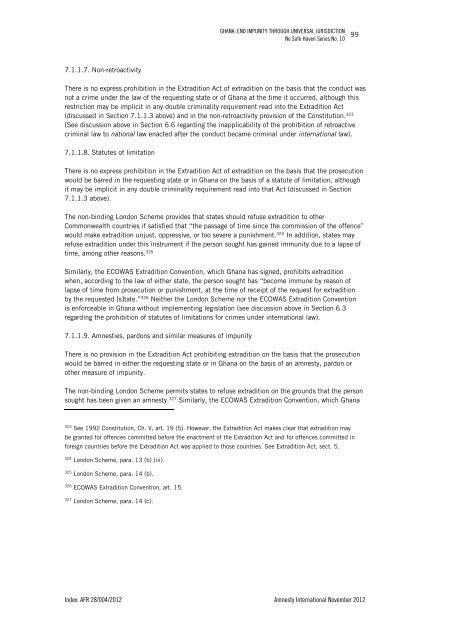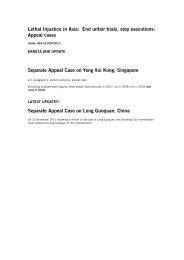Ghana - Amnesty International
Ghana - Amnesty International
Ghana - Amnesty International
Create successful ePaper yourself
Turn your PDF publications into a flip-book with our unique Google optimized e-Paper software.
GHANA: END IMPUNITY THROUGH UNIVERSAL JURISDICTIONNo Safe Haven Series No. 10997.1.1.7. Non-retroactivityThere is no express prohibition in the Extradition Act of extradition on the basis that the conduct wasnot a crime under the law of the requesting state or of <strong>Ghana</strong> at the time it occurred, although thisrestriction may be implicit in any double criminality requirement read into the Extradition Act(discussed in Section 7.1.1.3 above) and in the non-retroactivity provision of the Constitution. 323(See discussion above in Section 6.6 regarding the inapplicability of the prohibition of retroactivecriminal law to national law enacted after the conduct became criminal under international law).7.1.1.8. Statutes of limitationThere is no express prohibition in the Extradition Act of extradition on the basis that the prosecutionwould be barred in the requesting state or in <strong>Ghana</strong> on the basis of a statute of limitation, althoughit may be implicit in any double criminality requirement read into that Act (discussed in Section7.1.1.3 above).The non-binding London Scheme provides that states should refuse extradition to otherCommonwealth countries if satisfied that “the passage of time since the commission of the offence”would make extradition unjust, oppressive, or too severe a punishment. 324 In addition, states mayrefuse extradition under this instrument if the person sought has gained immunity due to a lapse oftime, among other reasons. 325Similarly, the ECOWAS Extradition Convention, which <strong>Ghana</strong> has signed, prohibits extraditionwhen, according to the law of either state, the person sought has “become immune by reason oflapse of time from prosecution or punishment, at the time of receipt of the request for extraditionby the requested [s]tate.” 326 Neither the London Scheme nor the ECOWAS Extradition Conventionis enforceable in <strong>Ghana</strong> without implementing legislation (see discussion above in Section 6.3regarding the prohibition of statutes of limitations for crimes under international law).7.1.1.9. Amnesties, pardons and similar measures of impunityThere is no provision in the Extradition Act prohibiting extradition on the basis that the prosecutionwould be barred in either the requesting state or in <strong>Ghana</strong> on the basis of an amnesty, pardon orother measure of impunity.The non-binding London Scheme permits states to refuse extradition on the grounds that the personsought has been given an amnesty. 327 Similarly, the ECOWAS Extradition Convention, which <strong>Ghana</strong>323See 1992 Constitution, Ch. V, art. 19 (5). However, the Extradition Act makes clear that extradition maybe granted for offences committed before the enactment of the Extradition Act and for offences committed inforeign countries before the Extradition Act was applied to those countries. See Extradition Act, sect. 5.324London Scheme, para. 13 (b) (iii).325London Scheme, para. 14 (b).326ECOWAS Extradition Convention, art. 15.327London Scheme, para. 14 (c).Index: AFR 28/004/2012 <strong>Amnesty</strong> <strong>International</strong> November 2012
















